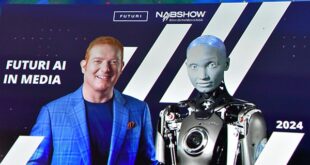My Cognitive autoMOBILE Life: Digital Divorce from a Cognitive Personal Assistant is a fascinating new book by AI and automotive industry experts Sebastian Wedeniwski and Stephen Perun. In it, they describe the car of the near future: it can answer your questions, navigate the best routes, respond to your needs, and drive you places.
Now think of all the data that car would amass about your life and work. Like Alexa at home and Siri in your phone, it learns your habits and gets better at its job every day, as the authors explain. Soon your car will know you as well as you know yourself — with a robotic clarity you may only achieve on that second cup of coffee (possibly brewed by your car). But what happens to all that knowledge if you want to change cars? How easy is it to break up with your car without your data being out there? That’s just one of the issues the authors bring up.
Wedeniwski and Perun have been working on the forefront of the future, if you will, for decades. They have the kinds of resumes most of us can’t even imagine: technology strategists, experience in the Internet of Things, and also clear familiarity with the kinds of challenges that face businesses. Their timeline for cognitive cars is a mere ten years, give or take, and depending on how quickly infrastructure and related fields can get their acts together. But as far as the technology, they say, we’re not very far away at all.
In other words, in ten years, the car you drive will actually not be driven by you at all, but rather will be an indispensable digital hub, as critical to your life and work as your office or your home. It brings a whole new level of hellishness to the concept of someone stealing your car while you’re off at the mall.
Except, (and yes, I’m having fun with this) you won’t be at the mall, since you can shop for anything you want from within your car. But this is also a book drenched with information — and respect — for the remarkable evolution of Artificial Intelligence (AI), cognitive machines, and data and analytics. If you don’t know much about these concepts, this is a great book to dive in with. If you do, you’ll probably be nodding your head every page.
As the authors point out, self-driving cars are the tip of the iceberg. So are the companies redefining the business of transportation. Uber, for all its workplace problems, has essentially reinvented how we get around cities — and has rendered a whole range of other services profoundly out of date, including 911.
Another platform the authors point out is car2go, a car sharing service in which you can grab a car2go vehicle on the road and pay to drive it by the minute. Instead of owning the road, we borrow it. And are then free of all the other expenses associated with the so-called privilege of owning a car. Think about that.

Of course it’s not just companies like this that are going to make it harder for that salesperson down at the Honda dealership to make their year-end quotas. Though Honda is already working on innovations itself, such as a Honda R&D Driver Coaching System prototype — which works with IBM’s supercomputer system, Watson. The concept is that it will literally help us drive better as we drive.
There’s a car in Finland that is learning how to drive in snowstorms — imagine just being able to sit back and relax instead of white-knuckling it down through a whiteout. The very nature of a car — its functions, its role in our lives, and our emotional attachments to it — are changing as technology evolves.
And therein lies the cautionary side of this book. These authors are brilliant insiders with a clear (and equally brilliant) glimpse into the future. As they meticulously lay out the history of the autonomous automobile and industry changes, and how AI and analytics work, a clear sense emerges. Consumers or enterprise businesses, most of us walk around asleep and oblivious, just taking it day to day.
The concept of radical changes are perhaps too shocking to actually believe. But this book makes it completely believable, tangible, and compelling. Rather than ignore what’s coming, say Wedeniwski and Perun, we absolutely should embrace it and then dive in. We need to plot a course that makes sure we benefit from these remarkable changes.
If we adhere to one specific rule: that cognitive machines and AI have to serve humans, and not the other way around, we will be a whole lot better off. And by the way, that also means figuring out how, indeed, we are going to safely separate from these tools as well. Hence the clever title, but let’s hope we’re better equipped for that kind of divorce than we are when it comes to marriage.
For more about the authors and their new book, visit their website
 Blogcritics The critical lens on today's culture & entertainment
Blogcritics The critical lens on today's culture & entertainment




